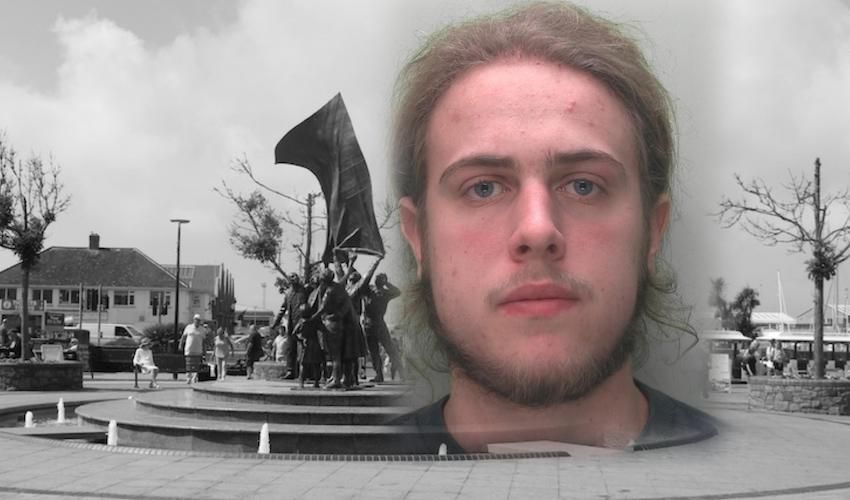

A teen jailed for driving another man into the ground headfirst during a drunken fight, causing him to require emergency surgery, has failed to convince the Royal Court that his sentence should be overturned.
Charlie Hackett Robinson (18) yesterday returned to the Royal Court to apply for permission to appeal against his two-and-a-half-year sentence of youth detention and serve community service instead.
Robinson was sentenced after performing a banned wrestling move on another teenager who then had to be taken to the UK for emergency head surgery. The incident took place on 22 April this year in the Liberation Square and it was captured on CCTV in its entirety.
However, the Appeal Court has decided to maintain the original sentence, refusing Robinson permission to take his bid to quash his sentence any further.

Pictured: The appeal was heard in the Royal Court.
During the Royal Court appeal hearing yesterday, Advocate Heidi Heath argued that the sentencing court had made the wrong decision in imposing a custodial sentence on her client as it hadn’t properly considered Robinson’s rights as a young offender or the extent of the remorse he had for his actions on the night in question.
Under the Young Offenders’ Law in Jersey, the Courts are obligated to only impose a custodial sentence if the offence is so serious that any alternative cannot be justified.
Noting that this was her client’s first offence, the fact he took full responsibility for his actions, that he was assessed as being at ‘low risk’ of reconviction and that this offending was “out of character” – Advocate Heath claimed that the sentencing court had not properly considered this offence within its true context.
The Court, she said, “should have taken a more comprehensive, holistic approach.”
She took issue in particular with a phrase used by the then-Deputy Bailiff Tim Le Cocq in the Court’s sentencing judgment when he stated: “In our view, what we have seen in the CCTV leaves us inevitably to conclude that this was too serious to deal with by a non-custodial disposal.”
It was the word “inevitably”, the defence lawyer asserted, which demonstrated that the sentencing court, “...failed to take into account the other alternatives and the extent of the mitigation available to the appellant."
Elsewhere in her submissions, Advocate Heath said that her client’s remorse had also been mis-characterised by the sentencing court as “limited” due to what they saw as attempts to minimise his actions in the immediate aftermath of the offence, before going onto express genuine regret later on.

Pictured: The incident was captured on CCTV.
Attempting to shed light on how her client behaved immediately following the incident, Advocate Heath explained: “This is a difficult situation clearly for the victim, but also something difficult for the appellant to process. He’s an 18-year-old man who has never been in trouble with the police before… [He] has to wake up the next morning and face what he has done. Many adults would struggle to accept that and deal with that.”
Crown Advocate Chris Baglin, appearing for the prosecution, began his rebuttal of the appeal by playing the CCTV footage of the incident twice for the Court – once in real time and once in slow-motion.
He claimed that the facts of the case “are lucidly clear” and, taken with the CCTV footage, he characterised this offence as “street violence… committed in drink”.

Pictured: The assault took place in Liberation Square.
Focusing on the injuries sustained by Robinson’s victim – who had to be flown to Southampton in order to undergo a serious operation on his skull – the Crown Advocate maintained that the sentencing court had formed the “entirely correct” view of this offending in that it was so serious, custody was justified.
Crown Advocate Baglin also contended that the way the Court had interpreted Robinson’s remorse was also correct, claiming that the teenager had been “sorry for the consequences rather than his actions."
Royal Court Commissioner Julian Clyde-Smith presided over the appeal hearing, accompanied by Jurats Elizabeth Dulake, Robert Christensen, Anthony Olsen, Charles Blampied and Pam Pitman.
Handing down the Appeal Court’s decision, Commissioner Clyde-Smith explained that the sentencing court’s approach was both “justified in law” and “correct in principle."
The Jurats also found that neither had the sentencing court made their decision on the basis of a mistaken fact with regards to Robinson’s remorse, saying: “The sentence imposed properly reflected all the mitigation available to the appellant.”
Comments
Comments on this story express the views of the commentator only, not Bailiwick Publishing. We are unable to guarantee the accuracy of any of those comments.